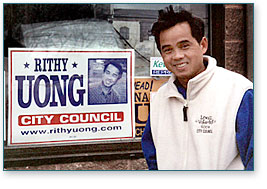|
 Because K-12 educational issues have continued to be important to Southeast
Asian American populations, some individuals have successfully run for elected
political office on school boards, city councils, and other influential positions.
This typically occurs in areas with concentrated ethnic communities such as San
Jose and Garden Grove, California (Vietnamese), Minneapolis-St. Paul, Minnesota
and central California (Hmong), and Lowell, Massachusetts (Cambodian). This trend
reflects the shifting emphasis of Southeast Asian Americans within the K-12 education
system from bilingual services and cultural adaptation to advocacy and empowerment
issues. Advocacy efforts related to educational issues, including the development
of linguistically and culturally responsive educational resources and services
for all ages, have been especially important commitments for Southeast Asian American
mutual assistance associations, community-based organizations, and faith-based
organizations. Ethnic groups have created organizations to help raise college
scholarship funds and to hold workshops on college admission requirements. Because K-12 educational issues have continued to be important to Southeast
Asian American populations, some individuals have successfully run for elected
political office on school boards, city councils, and other influential positions.
This typically occurs in areas with concentrated ethnic communities such as San
Jose and Garden Grove, California (Vietnamese), Minneapolis-St. Paul, Minnesota
and central California (Hmong), and Lowell, Massachusetts (Cambodian). This trend
reflects the shifting emphasis of Southeast Asian Americans within the K-12 education
system from bilingual services and cultural adaptation to advocacy and empowerment
issues. Advocacy efforts related to educational issues, including the development
of linguistically and culturally responsive educational resources and services
for all ages, have been especially important commitments for Southeast Asian American
mutual assistance associations, community-based organizations, and faith-based
organizations. Ethnic groups have created organizations to help raise college
scholarship funds and to hold workshops on college admission requirements.
In addition, first-generation Southeast Asian Americans continue to be involved
with schools, temples, and other educational institutions in their homelands,
both public and private. Their efforts include fundraising for new construction
and renovation of schools in local villages. Others range from consulting and
technical assistance projects with higher education institutions to educational
exchange programs that reconnect youth with homeland cultures and heritage languages.

|


 Because K-12 educational issues have continued to be important to Southeast
Asian American populations, some individuals have successfully run for elected
political office on school boards, city councils, and other influential positions.
This typically occurs in areas with concentrated ethnic communities such as San
Jose and Garden Grove, California (Vietnamese), Minneapolis-St. Paul, Minnesota
and central California (Hmong), and Lowell, Massachusetts (Cambodian). This trend
reflects the shifting emphasis of Southeast Asian Americans within the K-12 education
system from bilingual services and cultural adaptation to advocacy and empowerment
issues. Advocacy efforts related to educational issues, including the development
of linguistically and culturally responsive educational resources and services
for all ages, have been especially important commitments for Southeast Asian American
mutual assistance associations, community-based organizations, and faith-based
organizations. Ethnic groups have created organizations to help raise college
scholarship funds and to hold workshops on college admission requirements.
Because K-12 educational issues have continued to be important to Southeast
Asian American populations, some individuals have successfully run for elected
political office on school boards, city councils, and other influential positions.
This typically occurs in areas with concentrated ethnic communities such as San
Jose and Garden Grove, California (Vietnamese), Minneapolis-St. Paul, Minnesota
and central California (Hmong), and Lowell, Massachusetts (Cambodian). This trend
reflects the shifting emphasis of Southeast Asian Americans within the K-12 education
system from bilingual services and cultural adaptation to advocacy and empowerment
issues. Advocacy efforts related to educational issues, including the development
of linguistically and culturally responsive educational resources and services
for all ages, have been especially important commitments for Southeast Asian American
mutual assistance associations, community-based organizations, and faith-based
organizations. Ethnic groups have created organizations to help raise college
scholarship funds and to hold workshops on college admission requirements.